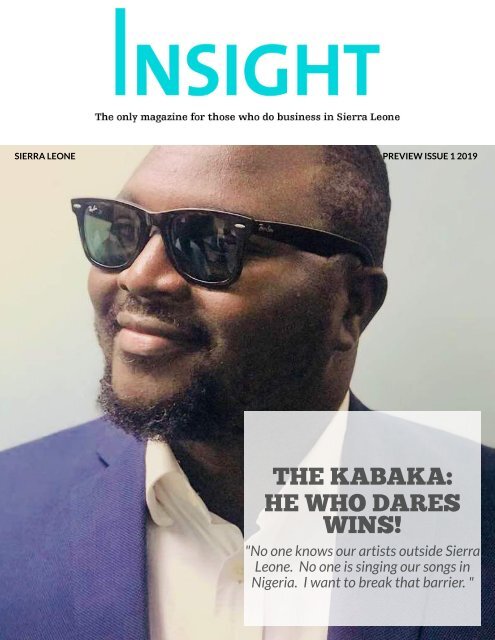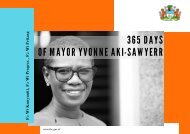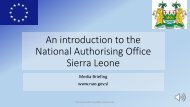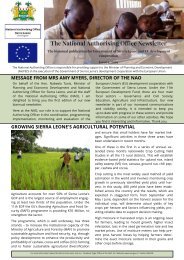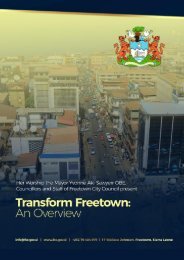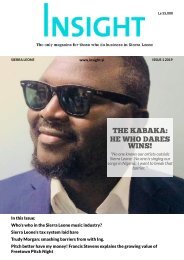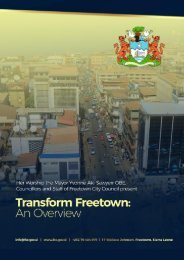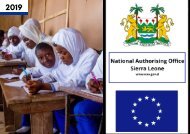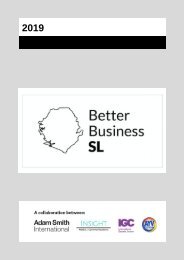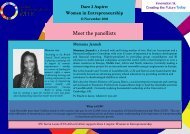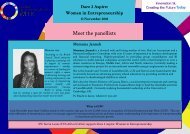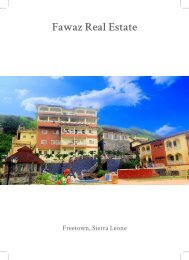THE KABAKA, HE WHO DARES WINS
Out soon - this year's 1st issue of Insight - the only magazine for those who do business in Sierra Leone. In the meantime - have a read of of our Kabaka profile. It's KME baby!
Out soon - this year's 1st issue of Insight - the only magazine for those who do business in Sierra Leone. In the meantime - have a read of of our Kabaka profile. It's KME baby!
You also want an ePaper? Increase the reach of your titles
YUMPU automatically turns print PDFs into web optimized ePapers that Google loves.
SIERRA LEONE PREVIEW ISSUE 1 2019<br />
<strong>T<strong>HE</strong></strong> K A BA K A :<br />
<strong>HE</strong> <strong>WHO</strong> DA RES<br />
<strong>WINS</strong>!<br />
"No one knows our artists outside Sierra<br />
Leone. No one is singing our songs in<br />
Nigeria. I want to break that barrier. "
K A BA K A : <strong>HE</strong> <strong>WHO</strong> DA RES <strong>WINS</strong>!<br />
Despite Africa?s huge influence on music repertoire across<br />
the globe, poor distribution networks and weak intellectual<br />
property laws, coupled with rampant piracy represent<br />
continuing challenges to the sector?s long-term growth.<br />
Industry experts and academics say it?s hard to calculate just<br />
how much the continent?s music industry is worth,<br />
nevertheless, it?s undoubtedly a market with real<br />
opportunity. A major reason is that spending on music<br />
related products and services is determined more by the age<br />
of the population than by its comparative wealth. In Africa,<br />
60% of the population is under 24 years old ? the youngest<br />
population of any region globally. Even for a small market like<br />
Sierra Leone, this represents a hugely under-tapped<br />
opportunity, particularly given our growing list of<br />
commercial talent.<br />
One man - Abu Bararr Turay, aka the<br />
Kabaka - is determined to change that,<br />
and anyone who has spent any time in<br />
Sierra Leone over the past couple of<br />
years, could not possibly have missed<br />
the growth of his eponymous label -<br />
KME or Kabaka Multimedia<br />
Entertainment.<br />
In person Kabaka is unexpected. For<br />
someone who may be Sierra Leone?s<br />
very own Berry Gordy, he?s<br />
surprisingly quiet. He favours<br />
understated black suits and has the<br />
knack of adding a business angle to<br />
most social occasions, reflective<br />
perhaps of his day job. He is a lawyer<br />
by profession, with 10 years of<br />
experience practising in Sierra Leone.<br />
He founded KME in 2017, and in the<br />
space of just over a year he has<br />
emerged with dizzying speed, as a<br />
genuine music mogul in the making.<br />
His track record speaks for itself. He?s<br />
assembled a credible stable of artists<br />
and last year struck a deal with the<br />
biggest name in Ghanaian<br />
entertainment for them to perform at<br />
Ghana meets Naija, held in Ghana. He<br />
bought a radio station, and to top it all,<br />
he conceived and staged the ambitious<br />
ECOFEST concert which brought<br />
performers from all over West Africa<br />
into Sierra Leone. It is no surprise that<br />
2018 culminated with his inclusion in<br />
Salone Times?list of the 10 Most<br />
Influential Sierra Leoneans, alongside<br />
the President of Sierra Leone and the<br />
Mayor of Freetown.<br />
He says he?s always been interested in<br />
the music industry. ?In school I used to<br />
rap,? he reminisces, but he entered the<br />
business of music when he started to<br />
manage his brother-in-law ? the R&B<br />
artist, Blesz. He went on to briefly join<br />
forces with Boxx Conteh to bring<br />
WizKid to Sierra Leone. Then came<br />
KME baby.<br />
?I was looking for a way to invest. I<br />
wanted something that would be<br />
different from my normal routine. I?d<br />
seen that there was a gap in the<br />
market for better management of our<br />
artists. Their lives were not reflective<br />
of their talent. Their remuneration was<br />
not commensurate with their status.<br />
You?d see top stars in Sierra Leone<br />
struggling to afford a taxi. One of the<br />
issues is that a lot of people who are<br />
involved in artist management don?t<br />
have the necessary business skills. I<br />
have the knack of doing things in a<br />
better fashion and bringing business<br />
acumen, legal skills, accounting, and<br />
procedure to the table. All of that<br />
coupled with a belief in taking on<br />
challenges made me decide to start my<br />
own record label.?<br />
KME was launched with a<br />
star-studded event on 28th April 2017<br />
at Radisson Blu in Freetown. The<br />
intervening months have been a<br />
roller-coaster of hard knocks and high<br />
points, defined predominantly by<br />
Kabaka?s decision to stake everything<br />
? cash, reputation, time and energy to<br />
bring ECOFEST (the Ecowas Music<br />
Festival) to Sierra Leone.<br />
ECOFEST was held on 16 November<br />
2018 at the Siaka Stevens Stadium. It<br />
was a hugely ambitious undertaking,<br />
pitting performers from Guinea,<br />
Ghana, the Gambia, Nigeria, Liberia<br />
and Senegal against Sierra Leonean<br />
artists.<br />
For months, the event dominated<br />
Sierra Leone?s social media news<br />
network. ?Are you going to ECOFEST??<br />
was probably one of the most-asked<br />
questions of last year, coming a close<br />
second to ?who did you vote for??.<br />
People who had long since ruled out<br />
ever attending a concert in the<br />
stadium, paused for thought when<br />
ECOFEST was mentioned.<br />
Kabaka had invited international<br />
media. He had also invited Mike Dada<br />
the President and Executive Producer<br />
of the prestigious All Africa Music<br />
Awards, AFRIMA, an organisation that<br />
aims to build professional capacity and<br />
networks within the continent?s music<br />
and creative industries.<br />
The sheer audacity of ECOFEST still<br />
takes the breath away. The creaky and<br />
distinctly dilapidated facilities of Sierra<br />
Leone?s Siaka Stevens Stadium were<br />
www.insight.sl
<strong>HE</strong> SCORED A<br />
BIG WIN W<strong>HE</strong>N<br />
<strong>HE</strong> SIGNED<br />
NIGERIA N<br />
A RTIST -<br />
PA TRORA NK ING<br />
never designed to host a Kabaka-conceived spectacular of 30 artists, from<br />
seven countries performing on a specially designed centralised stage, with an<br />
ambitious lightshow, before an audience of tens of thousands.<br />
In the execution, challenges with security, sound quality, timing, ticketing,<br />
crowd control and other aspects of event management were expected and<br />
planned for. But as is often the way in Sierra Leone?s logistically-compromised<br />
environment ? the best laid plans of mice and men often go awry, and<br />
unsurprisingly post-concert reviews were mixed. There were those who loved<br />
it and those who felt quite the opposite. Nevertheless, ECOFEST may just have<br />
marked the moment that Kabaka truly became Sierra Leone?s first bona fide<br />
music mogul.<br />
The story of how ECOFEST came about is uniquely Kabaka ? a mixture of<br />
entrepreneurial initiative, good old nous, and cultural humility. It began with a<br />
meeting between Kabaka and the Ghanaian media personality and<br />
entrepreneur - Nathan Kwabena Anokye Adisi, popularly known as Bola Ray.<br />
?Bola Ray owns Empire Entertainment ? it?s the biggest broadcast and event<br />
management company in Ghana. It hosts Ghana meets Nigeria, which has been<br />
bringing artists from the two countries together for several years now,? Kabaka<br />
explains. ?I got his number and gave him a call. I said to him - I have arguably the<br />
biggest record label in Sierra Leone, let?s talk. No one knows our artists outside<br />
Sierra Leone. No one is singing our songs in Nigeria. I want to break that<br />
barrier. Take me as your younger brother. You are the pioneers and I?m not shy<br />
to admit we need help.?<br />
When Bola Ray offered to include KME?s artists in the line-up for Ghana meets<br />
Nigeria, in June 2018, Kabaka jumped at the opportunity. ?I took all my artists<br />
and three who were not on my label, to Ghana. We opened the concert. The<br />
idea was that we would then host Ghana meets Naija in Sierra Leone. But on<br />
reflection I thought twice about the reaction we would get if we held a concert<br />
of foreign artists. Then I thought about ECOWAS and the Mano River basin, and<br />
I said let?s escalate Ghana meets Nigeria. Let?s have five nations represented in<br />
Sierra Leone.?<br />
Kabaka sat down and wrote out the proposal and worked out what it was going<br />
to cost. The list of items on his budget included the PA system, generators, the<br />
cost of hiring out the stadium, promotion and marketing,<br />
printing costs, flights and accommodation and, of course,<br />
security.<br />
?The budget was $200,000. I did the maths to work out how<br />
I could make the money back. I considered three scenarios ?<br />
how much I?d make from an average show, a good show and<br />
a really good show.? His next steps were to secure the<br />
money, and the artists.<br />
Kabaka?s approach to the finance was two-pronged. First, he<br />
went to his bank for a business loan. Events such as the one<br />
he was planning, are seldom considered as viable<br />
propositions, by banks in Sierra Leone, he warns. ?There is<br />
no precedent at any of the banks for this kind of thing. They<br />
wouldn?t generally touch an event like this. They want to see<br />
specific products.?<br />
There are three pillars to his successful relationship with his<br />
bank which all aspiring entrepreneurs could learn from.<br />
These are longevity, trust and collateral. ?I?ve been banking<br />
with Commercial Bank for some time. I have a good<br />
relationship with them,? he explains. ?They have watched<br />
our company?s development and witnessed how we have<br />
handled previous events. They know me as someone who<br />
keeps to my word, has standards and is able to put up the<br />
required collateral.?<br />
Kabaka was also hoping for sponsorship, but his business<br />
plan did not depend on it. He says that while sponsors help<br />
mitigate costs, Sierra Leone?s corporate world is still very<br />
risk averse.<br />
While he was raising the finance, he was simultaneously<br />
approaching the performers he wanted for the event. He<br />
scored a big win when he signed Nigerian artist Patoranking,<br />
who since 2009 has become one of Nigeria?s leading artists<br />
with his brand of reggae-dancehall influenced Afrobeats.<br />
?The sooner we signed Patoranking, we had calls from Ivory<br />
Coast, Senegal and Gambia,? Kabaka remembers.<br />
The final line up was impressive ? seven nations and their<br />
artists. Nigeria was represented by Patoranking and<br />
Mayorkun. Kuami Eugene and Patapaa came in from Ghana.<br />
Takana Zion represented Guinea; Liberia was CIC and<br />
Photo by Nainoa Shizuru on Unsplash
Photo by israel palacio on Unsplash<br />
Stunna. From the Gambia came Double T and J Kelly. There was<br />
the Senegalese artist Fafadi and home grown talent like LXG,<br />
LAJ, Dallas B, Arkman, Drizilik, Yung Sal, Empress P, Innocent<br />
and Rap G, as well as KME?s own stable of performers.<br />
One of Kabaka?s strengths is his willingness to do an honest<br />
post-event analysis and, in the process learn from his mistakes.<br />
It?s something he feels has contributed to his professional<br />
growth. ?People do the same things time and time again and<br />
expect different results,? he muses. He refers back to an event<br />
he held in Kallon Carpark opposite Kallon?s Hotel on Christmas<br />
Day in 2017, where he learned a hard lesson about security. ?It<br />
was well attended. Around 5000 people,? he remembers, ?but<br />
we made no money because our security was too porous.?<br />
His experience as co-promoter for the WhizKid concert<br />
provided lesson two. ?I manned the gates myself. I lost my<br />
investment but I bought knowledge and understanding in the<br />
process. I?ve learned that security is as important as the sound<br />
system.?<br />
His experience may be hard won, but he is adept at putting it to<br />
good use. The music industry is evolving rapidly, especially in<br />
Africa,? he says. ?Money generation in more developed markets<br />
includes repeat fees, CD sales, royalties, streaming. But the<br />
areas we need to focus on for now in Sierra Leone, are events,<br />
promotions, merchandise.?<br />
There is also significant and much-needed export potential in<br />
our music industry. As Paul Collier, Oxford Professor and<br />
leading economist once said: ?At the practical level, the music<br />
industry has the potential to have a big impact on economic<br />
structure precisely because these economies are so small. You<br />
only need one or two real successes--you only need a<br />
Nashville--and you have transformed the export structure of an<br />
economy away from primary commodity dependence, and that<br />
will have major effects.<br />
?There is also a psychological level. This is really important.<br />
Africa has to be seen to be succeeding in activities that have<br />
some glamour about them if it is to retain its own bright young<br />
people. At the moment, bright young Africans are leaving the<br />
continent. They are all over America. A vision that will retain<br />
bright youth in productive activities within Africa is essential.<br />
Another important psychological dimension is that until now,<br />
Africa has really not participated in global economic institutions.<br />
We need to be able to show how the new international<br />
economic architecture is relevant to Africa and that Africa can<br />
benefit from being part of it. The music industry has a potential<br />
for that. It has the potential to be a very visual practical image in<br />
turning a poor society around. The Nashville example is potent<br />
here in showing how a poor locality can be turned around.?<br />
Key to maximising the sector?s potential is government<br />
recognition that the music business is a business and not just a<br />
cultural activity and that an abundance of creative talent is not<br />
the same having a successful music industry. Genuine<br />
Government support for the sector in the form of a policy<br />
framework, regulation, creative hubs and music education in<br />
schools and elsewhere is essential.<br />
In this, Kabaka, with his black suits, lawyerly demeanour and<br />
focus on the bottom line may be just what Sierra Leone needs to<br />
get the ball rolling. After all, music ? it?s another business baby!<br />
www.insight.sl


